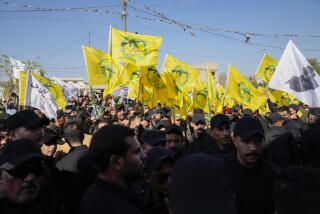Yemen smolders amid Houthi insurgency and Al Qaeda attacks
- Share via
Reporting from Cairo — The Yemen summer has seethed with pitched battles and bloodshed, raising fears that the country will tumble into further disarray even as Washington has more than doubled its military and security aid.
Gun fights and explosions break out in spasms across a nation at the dangerous intersection of the Middle East and the Horn of Africa. In the south, an Al Qaeda-linked network has carried out strategic attacks on security targets, while in the north, a rebel group has renewed fighting against rival tribes and government forces.
The country is accustomed to extremism and tribal animosities, but the fighting is an indication that President Ali Abdullah Saleh remains unable to outflank his enemies, despite increased raids on Al Qaeda militants and a restive truce with the northern insurgent group, known as the Houthis.
Desperation and anger are feeding militant organizations such as Al Qaeda in the Arabian Peninsula, which has also set its sights on international targets. It claimed responsibility for the failed bombing of a U.S. passenger jet in December and the attempted assassination of a Saudi prince.
Washington has increased its security assistance to Yemen from $67 million to $150 million and is training and providing intelligence to the country’s special forces.
The Al Qaeda faction responded with an assassination attempt on the British ambassador in April, a string of deadly attacks on security forces that began in June and is apparently behind the launch of an English-language magazine, Inspire, aimed at broadening recruitment with articles on making bombs and using encrypted messages.
Al Qaeda’s assaults in the south have been bold and coordinated, including simultaneous attacks on two police stations July 14 in Zinjibar that killed at least three officers and a June raid on a security headquarters in Aden, freeing prisoners and killing 11 people. They come as American-born cleric Anwar Awlaki, whom the Obama administration is seeking to assassinate, is becoming more prominent in the militant group.
The recent attacks suggest Al Qaeda is manipulating its tribal connections to exploit tensions in a widening and violent southern secessionist movement. Filled with angry and unemployed young men, the south is rich territory for recruitment and inciting clans against the state.
“Al Qaeda wants to seduce the tribal people onto their side,” said Saeed Ali Jemhi, an expert on the group. “Young people have a high readiness.... They are very religious. They hate foreigners, especially Americans. So, Al Qaeda comes to them and it’s easy to convince them.”
The southern secessionist movement, which many officials regard as the most pressing threat to the nation’s stability, does not appear to share an ideology with or have significant ties to Al Qaeda in the Arabian Peninsula. Some analysts suggest, however, that the chaos orchestrated by both groups plays into a government’s strategy to portray them as twin dangers sharing the same objective.
“Every Al Qaeda attack in the south comes with great relief for the government and more pain for those who call for separation,” Hakim Almasmari, editor of the Yemen Post, wrote this week in a column headlined, “Government Hoping for more Al Qaeda Attacks in South.” “The government gains even more financial support from the international community as it is funding Yemen’s fight against extremism.”
In the north, a truce in February with the Houthi rebels ended six years of intermittent fighting that had left hundreds dead and more than 300,000 displaced.
But in recent weeks, clashes between the rebels and clans loyal to the government have killed dozens of people.
On Monday, tribal leaders say, the Yemeni army was drawn into the conflict when insurgents captured scores of soldiers and seized a military base in fighting that left at least 10 dead. Amid Defense Ministry denials that a large number of troops had been captured, tribal sources and unconfirmed news reports Thursday said the rebels had freed as many as 200 soldiers.
The Houthis have long complained of discrimination and sparse economic opportunities. Their war with the government went international last year when Saudi Arabia bombed Houthi positions for months after cross-border incursions by the rebels. Saleh said he doesn’t want another round fighting but it is unclear whether the government can repair the truce.
“In that area war is a way of life,” said Abdul-Ghani Iryani, a political analyst. “It’s not a breakdown of the system, it is the system.”
Special correspondent Alice Fordham in Sana, Yemen, contributed to this report.
More to Read
Sign up for Essential California
The most important California stories and recommendations in your inbox every morning.
You may occasionally receive promotional content from the Los Angeles Times.











